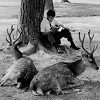Role and representation of Indochina's environment in novels written by Vietnamese francophone authors: between assimilation, resistance and hybridization
DOI:
https://doi.org/10.51777/relief12379Keywords:
: Francophone Vietnamese literature, ecocriticism, postcolonialism, postcolonial, hybridity, nature-cultureAbstract
The purpose of this article is to study the different literary ways for francophone Vietnamese authors to reappropriate the environmental theme in their books, whose action takes place in former French Indochina. The analysis combines ecocritical and postcolonial perspectives, in order to unveil their theoretical imbrication, more specifically concerning the questioning of the dichotomy between nature and culture, since this dualistic modern thinking has partly justified the colonization in creating a hierarchy between primitive societies and enlightened ones. The role of ‘places’ in francophone literatures reinforces the presupposed opposition between native land and land of exile or adoption, leading therefore to ambivalent strategies to re-enhance the place of the origins and the traditions linked to nature. The notion of “hybridity” finally helps to overcome this ontological distinction between nature and culture and participates, through its multiple meanings, in the founding of a new collective and individual identity.
Downloads

Downloads
Published
Issue
Section
License
Copyright (c) 2022 Aurore Nicolas

This work is licensed under a Creative Commons Attribution 4.0 International License.
All articles published in RELIEF appear in Open Access under the Creative Commons Attribution 4.0 International License (CC-BY 4.0). Under this licence, authors retain ownership of the copyright of their article, but they allow its unrestricted use, provided it is properly cited.






